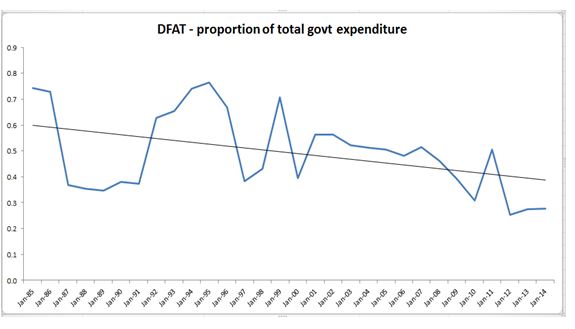Dr Cameron Hill and Nina Markovic
At a time when the Government is promoting its ‘Australia in the Asian Century’ White Paper and has been urged by a Parliamentary Committee to expand Australia’s overseas diplomatic presence, it seems counter-intuitive that the 2013–14 Budget subjects the Department of Foreign Affairs and Trade (DFAT) to significant efficiency measures, including temporary staffing reductions, and that an overseas mission is being closed and plans for new ones suspended. Current estimates (see graph) show that expenditure on DFAT is at historically low levels (0.3 per cent).

Source: Parliamentary Library (note: figures for 2012–13 and 2013–14 are estimates only)
Although the Government has yet to formally respond to the 2012 report of the Joint Standing Committee on Foreign Affairs, Defence and Trade’s inquiry into Australia’s overseas representation, the Budget might have been the opportunity to address the Committee’s recommendation that DFAT’s ‘funding be increased in the long term to a set percentage of gross domestic product sufficient for the creation of a diplomatic network appropriate to Australia’s standing in the G–20 and the [Organisation for Economic Cooperation and Development] OECD’.[1] The report also recommended that the increased demand for DFAT’s consular services be funded through ‘a combination of increased passport fees and a small hypothecated and indexed travel levy’.
Budget savings
DFAT’s contributions to the Government’s fiscal consolidation over the forward estimates include: public service ($5.3 million), departmental ($8.5 million), and capital ($60.1 million) efficiencies.[2] Further savings of $11.7 million in 2017–18 and $7.7 million in 2018–19 have been flagged.[3] Australia will also close its embassy in Hungary and will reportedly put plans to open an embassy in Senegal, announced in the 2012–13 Budget, on hold.[4]
Staffing reductions?
It was reported on the day before the Budget that the Foreign Minister had stated that DFAT would not be forced to reduce staff as a result of the Budget. He also denied that DFAT’s budget was in a ‘parlous position’.[5] While DFAT’s budget might not be ‘parlous’, it is confusing. The 2013–14 Budget states that part of DFAT’s savings will come ‘from a temporary reduction in Canberra-based positions in 2013–14’.[6] It is unclear where the ‘temporary reductions’ will come from, particularly when staffing across DFAT’s three Outcomes is projected to increase by a total of 58 in 2013–14.[7] It may be that these increases will be offset by decreases in non-permanent and/or contracted staff.
Wither the ‘Asian Century’?
There is no provision in the Budget for a new full embassy in Mongolia and/or new consulates in Thailand (Phuket), China (Shenyang) or eastern Indonesia, despite these being identified as priorities in the Asian Century White Paper.[8]
New funding measures
New measures involving DFAT include: $215.9 million over seven years to upgrade the Government’s classified communications network; $52.6 million over three years to upgrade the security of accommodation in Kabul; $50.6 million over seven years for a new High Commission in Kenya; $14.1 million over four years for DFAT’s continued coordination of the Regional Assistance Mission to Solomon Islands (RAMSI); and $4.3 million over one year to continue DFAT’s role in helping prevent people smuggling.[9] Mining and other trade links have been cited by the Government as being at the heart of the diplomatic investment in Africa.[10] As stated in the 2012–13 Additional Estimates and included in this year’s Budget, DFAT’s United Nations Security Council team has received $27.5 million over three years (out of a total of $30.7 million across three agencies) to secure additional representation at the UN headquarters in New York, as well as in Africa.[11]
[6]. Budget measures: budget paper no. 2: 2013–14, op. cit.
[7]. Portfolio budget statements 2013–14: Foreign Affairs and Trade Portfolio, op. cit., pp. 23, 31, 37.
[9]. Portfolio budget statements 2013–14: Foreign Affairs and Trade Portfolio, op. cit.; B Carr (Minister for Foreign Affairs), Protecting Australia’s interests abroad, media release, 14 May 2013, accessed 15 May 2013.
For copyright reasons some linked items are only available to members of Parliament.
© Commonwealth of Australia
In essence, you are free to copy and communicate this work in its current form for all non-commercial purposes, as long as you attribute the work to the author and abide by the other licence terms. The work cannot be adapted or modified in any way. Content from this publication should be attributed in the following way: Author(s), Title of publication, Series Name and No, Publisher, Date.
To the extent that copyright subsists in third party quotes it remains with the original owner and permission may be required to reuse the material.
Inquiries regarding the licence and any use of the publication are welcome to webmanager@aph.gov.au.
This work has been prepared to support the work of the Australian Parliament using information available at the time of production. The views expressed do not reflect an official position of the Parliamentary Library, nor do they constitute professional legal opinion.
Feedback is welcome and may be provided to: web.library@aph.gov.au. Any concerns or complaints should be directed to the Parliamentary Librarian. Parliamentary Library staff are available to discuss the contents of publications with Senators and Members and their staff. To access this service, clients may contact the author or the Library‘s Central Entry Point for referral.